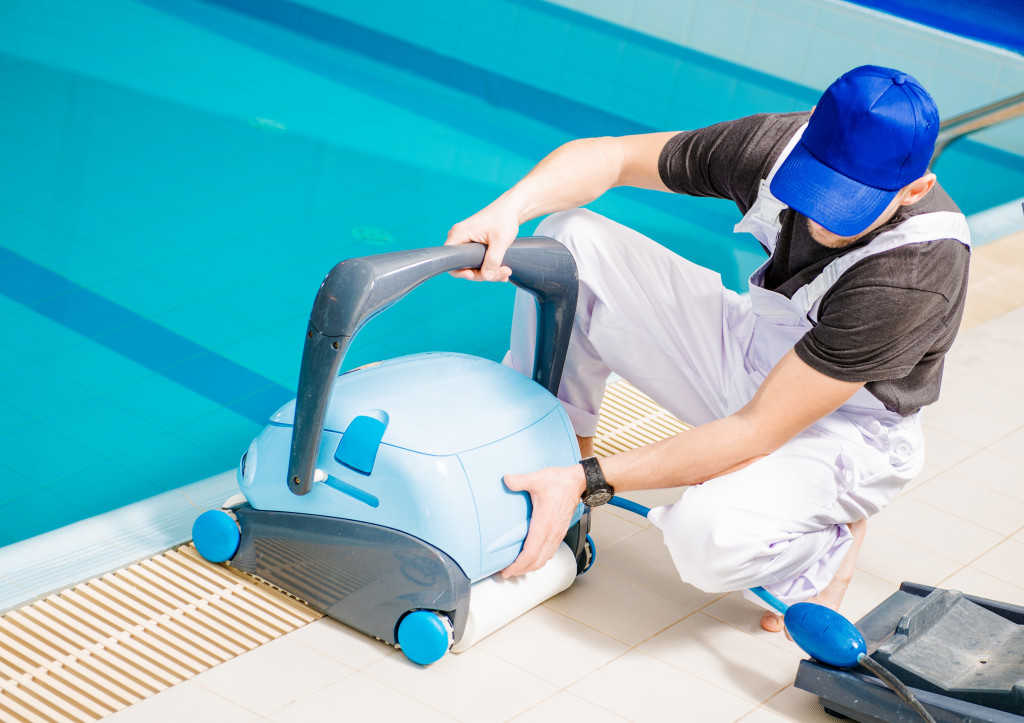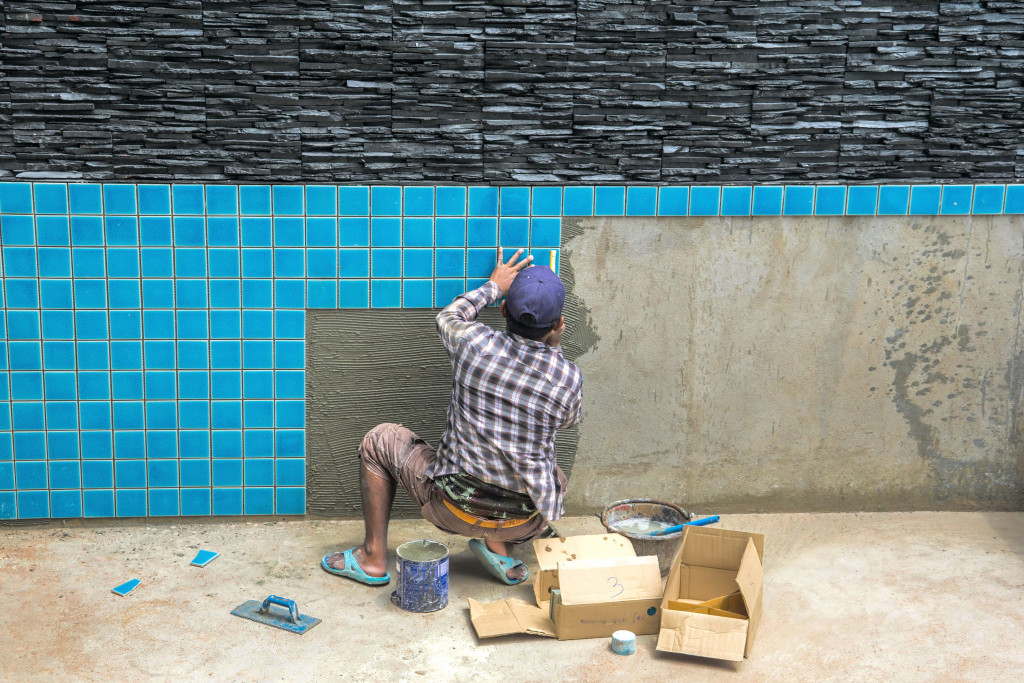- Home swimming pool maintenance and upkeep are crucial for its cleanliness, health, and equipment longevity.
- Regular cleaning and chemical balancing are essential to sanitary and safe pools, and utilizing advanced reverse osmosis can improve water quality.
- Pump and filter malfunctions, leaks, cracks, electrical problems, and heater failures are common pool repairs.
- DIY pool repairs can save money, but proper root cause analysis and the correct repair kit are essential.
- Maintaining a clean and healthy pool, preventing equipment malfunctions, and fixing issues promptly will ensure enjoyment and relaxation.
What better way to enjoy the warm weather than by taking a dip in your backyard pool? If you are lucky enough to have a swimming pool, then keeping up with regular repairs and upkeep is essential.
Proper maintenance and repairs are essential for keeping your home swimming pool in good condition. Neglecting regular upkeep can result in costly damages and repairs, not to mention health hazards. Routine maintenance and repairs can extend the life of your pool, reduce operating costs, and enhance the swimming experience.
One of the primary benefits of regular upkeep is that it ensures your pool stays clean and sanitary. Without proper cleaning, the water can become cloudy, and harmful bacteria can grow, leading to health hazards. Regular upkeep involves cleaning and balancing the chemicals in the water and checking and cleaning the filters, pumps, and skimmers.
Fortunately, maintaining a home swimming pool doesn’t have to be difficult or time-consuming—all you need is basic knowledge of how they work and the best equipment for keeping your pool clean and healthy. This ultimate guide to home swimming pool repairs and upkeep—so that you can ensure the only thing getting lost in your pool this summer will be hours of fun!
Common Home Swimming Pool Repair
Swimming pools are a great addition to any home, providing endless hours of fun and relaxation. However, as with any household amenity, they require regular maintenance and repairs. Regarding common home swimming pool repairs, pump and filter issues are at the top.
A malfunctioning pump or filter can lead to better water circulation and clean pool water. Leaks and cracks are other common issues, leading to water loss and further damage if not addressed promptly—electrical problems and heater malfunctions round out the list, which can be dangerous if not correctly handled.
Pool owners must stay on top of these repairs to ensure their pool stays in top condition and provides safe enjoyment for years.
Home Swimming Pool Upkeep
Maintaining a home swimming pool requires regular upkeep to ensure it remains safe and clean. You can enjoy a refreshing and relaxing swim whenever you desire by taking the necessary steps to maintain a home swimming pool.
Regular Cleaning
Regularly cleaning your home swimming pool is crucial to maintaining a healthy and enjoyable swimming experience. Not only does it keep the water crystal clear, but it also eliminates harmful bacteria and prevents potential health hazards. Unattended pools can quickly become a breeding ground for algae, mold, and unwanted debris.
Regular maintenance and upkeep of your swimming pool can save you money in the long run by reducing the need for costly repairs and extensive cleaning services. Whether you do it yourself or hire a professional, investing time and effort into regular cleaning will ensure your pool remains a clean and safe space for relaxation and enjoyment.
Tips for Pool Maintenance
Maintaining a clean and healthy pool should be on top of any pool owner’s to-do list. Proper pool maintenance not only keeps the water crystal clear and accessible but also extends the pool equipment’s life.
- Regularly test and correct the chemical balance in the water, which includes checking the pH, chlorine levels, and alkalinity.
- Skimming the pool surface regularly to remove debris and cleaning the pool walls with a brush can prevent the buildup of algae and other microorganisms.
- Ensuring the pool’s filtration system is working efficiently can also aid in the pool’s upkeep.
By following these tips, pool owners can enjoy their pool year-round while keeping it safe and healthy for swimming.
Chemical Balancing
Maintaining proper chemical balance is crucial for the health and safety of your home swimming pool. Chemical imbalances can cause skin, eye, and even respiratory issues. This is why it’s crucial to regularly test the chemical levels in your pool and adjust as needed.
Some key monitoring chemicals include chlorine, pH levels, alkalinity, and calcium hardness. You may need to add chemicals or adjust the filtration system to maintain proper balance. It’s also essential to properly store and handle chemicals and never mix different chemical types.
Utilizing Advanced Reverse Osmosis
Swimming pools are often a source of joy and relaxation during the hot summer. Unfortunately, pool water quality can deteriorate over time due to the accumulation of harmful chemicals such as cyanuric acid. Luckily, advanced reverse osmosis (RO) technology can help. Using RO, you can improve your pool water quality by removing impurities and lowering cyanuric acid levels in swimming pools.
RO pushes the pool water through a semi-permeable membrane that separates contaminants from the water. This results in crystal-clear water free of unwanted minerals, pollutants, and bacteria. With lower cyanuric acid levels, your pool water will become more effective at sanitizing and disinfecting, providing a safer and cleaner swimming experience for you and your family.

DIY Home Swimming Pool Repair Tips
Maintaining a swimming pool can be a challenging task, but it’s even more daunting when it comes to repairing it. However, with the right tips and tricks, you can save a lot of money and do it yourself.
- First, address the root of the problem instead of just patching it up. For instance, if your pool is losing water, find the leak source and repair it.
- Second, always use the correct pool repair kit or product as per the type of material your pool is made of. You can use epoxy, fiberglass, or vinyl liner repair kits or products, depending on the material of your pool.
- Third, feel free to ask for professional help if you are unsure about any DIY repair technique.
These tips give you a hassle-free and budget-friendly swimming pool repair experience.

Home swimming pools are a great addition to any property and offer fun, enjoyment, and relaxation. With proper repairs and maintenance, they can provide hours of entertainment to family and friends. However, maintaining a home swimming pool is a challenging feat, as specific components require upkeep to keep it running correctly.
It is important to regularly clean, balance chemicals, and utilize advanced reverse osmosis filtering systems to help maintain pool water quality. For those handy enough, many DIY home swimming pool repair tips are available online that can diagnose the issues and find manageable solutions for them. Taking care of your home swimming pool can be an enjoyable experience.
With proper knowledge of repairs and regular maintenance, you will surely enjoy your sparkling clean swimming pool all summer.





